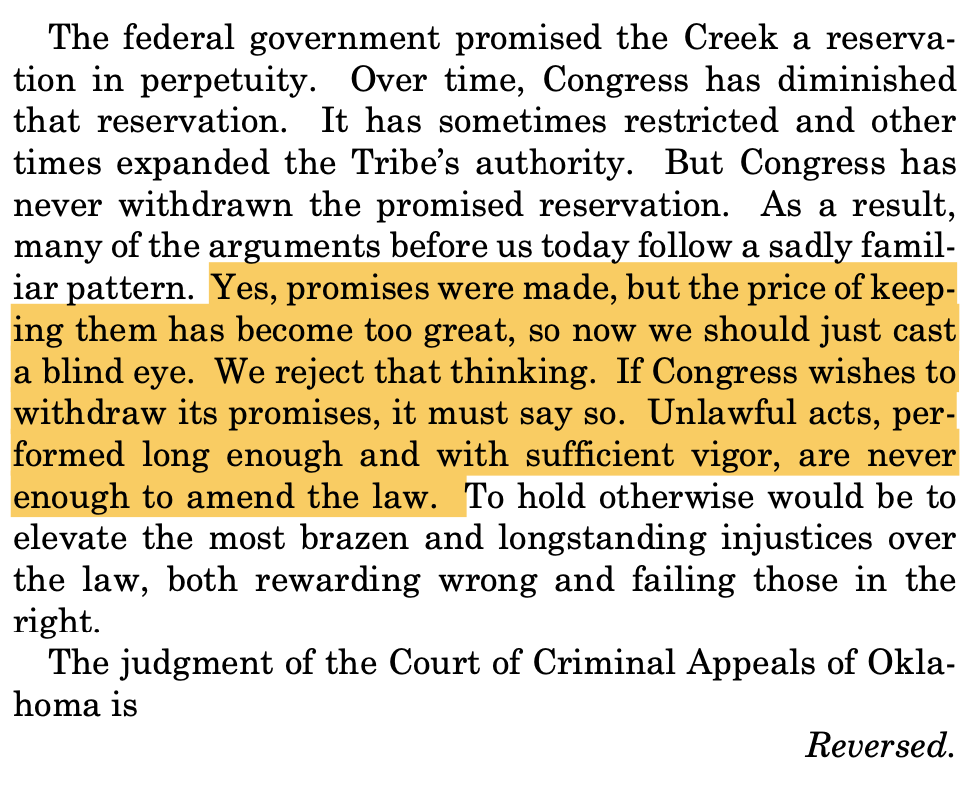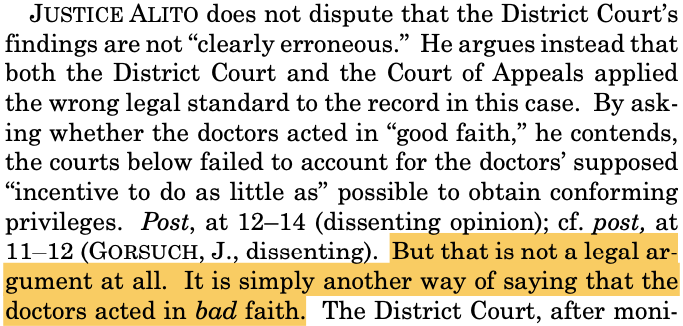The Supreme Court’s decision in McGirt v. Oklahoma is 86 pages of WOW, I didn’t have honoring our original treaties with the Muskogee/Creek on my 2020 Bingo Card!!

OPINION by GORSUCH: a, 1832 Treaty guaranteed land to the Creek, and promised that no US State or Territory would ever pass laws that would apply to the Creek people on that land. “[W]e hold the government to its word.” McGirt was convicted in Oklahoma State Court; he claims the state has no authority under the Federal Major Crimes act, which makes certain crimes committed by “Indians” on “Indian land” exclusively federal. Oklahoma claims that the land no longer belongs to the Creeks. OK state courts and the Tenth Circuit came to conflicting conclusions, so here we are.
States can’t change reservations (those are between the Tribes and the Feds). Allotment tried to break up the holdings, but the language permits private land within reservations, the Creek Reservation was never lawfully terminated, and Congress has explained that allotments don’t dissolve reservations anyway. (Likewise, land patents to homesteaders elsewhere didn’t dissolve the US’ sovereignty.) Congress may have hoped to dissolve the reservations by allotment, but didn’t get there.

OK points to other interference in the Tribe’s affairs, but those don’t change the law. OK notes that some of the region “has lost its Indian character,” but that doesn’t change the law. OK suggests that its disregard for federal law and habit of pulling the Creek into state courts proves something, but no. “Things only get worse from there.” Collected commentary from Tribal individuals and others does not change the law. The arrival of many white settlers (actually used by OK as evidence?) DOES NOT CHANGE THE LAW. OK’s efforts to get more of the Creek land through sketchy means once oil was discovered there… you know where this is going right? – STILL DOES NOT CHANGE THE LAW. “That would be the rule of the strong, not the rule of law.”
OK then suggests the reservation doesn’t exist, that Congress never made it, and I’m not even going to bother summarizing that – it’s too cray. Also, OK is trying to distinguish between a reservation and a “dependent Indian community” in a way that doesn’t help it legally, because OK lacks jurisdiction in both types of classifications. And then there is an argument that the treaty gave the Tribe fee title to the land, which they are pretending is bad. The Court isn’t having it, and hasn’t since 1900 or so.
OK then tries to argue that the merger of Oklahoma Territory and Indian Territory means that it is special and different from other states, but law on the books in 1885 says otherwise. So they tried the Enabling Act for OK statehood, but even that had federal court exceptions. (Why are they trying this on legal scholars?) OK took Creek people to state court anyway, but (say it with me) THAT DOES NOT CHANGE THE LAWS.
OK says that finding the Creek Reservations still exists would be complex, because it would mean up to half of OK still belongs to the Creek. To which the Court says, “And?”

(It’s hard to fairly summarize the dissent, because it feels too much like ‘possession is 9/10ths of the law.” I’m serious. Especially since it emphasizes intent, and says that you should respect the intended destruction of a tribe as law, even if that destruction was never completed explicitly, and even though Congress did things to RESTORE the Tribe’s sovereignty, too. It’s… weird.
It also comes so closely on the heels of the Bostick case (on transgender rights, among other things), where the conservatives insisted that you go back to the oldest law you can find and take it at its word UNTIL IT IS CHANGED EXPLICITLY: when their preferred approach was applied here, the conservatives suddenly switched standards. )
DISSENT by ROBERTS (with ALITO, KAVANAUGH, and THOMAS except for part): but! but! but! WHO COULD HAVE KNOWN that the laws are still on the books! How can the State do STATE THINGS if federal laws still apply! This is DESTABILIZING! And there was the Civil War! And there were SO MANY SETTLERS. And we will refer to reports about Congress’ intentions selectively. The population of Creek has been outnumbered. (WE WILL NOT USE MANY CITATIONS FOR THIS PART OF THE DISSENT!)
Intent, intent, intent, intent, intent. Everyone knew where this was going. Why did Congress have to be explicit? Laws were passed taking things away from the Creek; even if new laws were passed giving them those things back, that just proves that they were previously taken away (and what was our point again?). Any references to “former” lands mean ALL THE LANDS (notwithstanding all the transfers and changes of borders, which somehow couldn’t possibly be in this discussion?)(?!). If anyone among the Creek referred to the land as something other a reservation, that also means the treaty (which still exists legally) is gone because of the intent to dissolve everything through constant micro- and macro-aggressions. (p 46 – 82)
DISSENT by THOMAS: This Court lacks jurisdiction because of State law. Oklahoma deserves more respect. (p. 83 – 86).
‘If the state does you wrong for long enough, federal law doesn’t apply’ is kind of wild as an argument. I get the, ‘facts on the ground look bad,’ I get the complexity of forming new states and repeatedly dividing up jurisdictions between the feds and the states, but in nearly any other situation, the remedy for the state mistreating people because it was closer and the feds were far away would be a federal intervention. I mean, states the American South failed to guarantee lots of federal laws, and the Feds sometimes stepped in, which was the right thing to do. So. Gosh.



